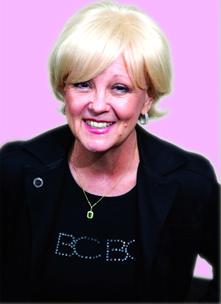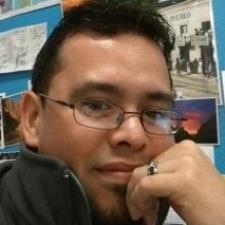 Post Classifieds
Post Classifieds
Survivor shares experience with breast cancer
Since October is Breast Cancer Awareness Month, we at The Bridge decided to highlight this important health issue. Dr. Annette Olsen-Fazi, a member of the Department of Language and Literature and a breast cancer survivor herself, graciously agreed to be interviewed. Olsen-Fazi currently serves on the Laredo Breast Cancer Coalition, headed by Drs. Eduardo Miranda, Gary Unzeitig, and Jessica Guajardo. Its main goal is to provide medical treatment to uninsured Laredo women who have been diagnosed with breast cancer. Currently, the coalition is concentrating on recruiting women for a clinical trial that will offer them cutting-edge treatment for free. I began our interview by asking Olsen-Fazi what inspired her to join the Laredo Breast Cancer Coalition.
Olsen-Fazi: When you get sick yourself, you realize it's quite a battle, quite a struggle to get well again. And it's something you can't do if you don't have the infrastructure. If you find yourself with a diagnosis of breast cancer and you don't have health insurance, you don't have anyone who takes care of you-what do you do? It makes you aware that not everybody's covered; not everybody has the ability to get well.Reyna: How did you find out you had breast cancer?Olsen-Fazi: The usual way [laughs]...through diagnosis. I knew something was wrong when I was in Tunisia, so I came home during Spring Break (of 2008] to find out what it was. And then I was told it was breast cancer.Reyna: What's this past year been like for you?Olsen-Fazi: Pretty tough-it's not fun. But one in eight women get breast cancer...it's become an epidemic in the Western world. I don't know if it's diet or a lack of exercise or because we're living longer, maybe a combination of all of the above. But breast cancer is the number two killer of women [after heart disease]. And the problem, of course, with breast cancer is not only is it growing in incidents but it's also hitting women younger and younger. It's not uncommon today to find women in their 30s, even 20s, with breast cancer. Reyna: How did you keep your spirits up?Olsen-Fazi: You have to, and I think the fact that you have people depending on you makes a big difference too. I've got an elderly mother who's not in good health and depends on me. I have two daughters of my own who need their mother, and I have a partner who needs me as well. You can't just say, 'I'm gonna curl up my toes and die.' You've got responsibilities to other people...And then, I'm a determined old coot. I'm going to fight back. I don't know who's going to win, but I'm going to fight to the very end, for sure.Reyna: I think when people find out they have a loved one with cancer, they often don't know what to say or do. What are some good ways to show support?Olsen-Fazi: Let me say one thing not to do, and then I'll give you some ideas of what to do. It's true that with our medical care today, more and more women are surviving breast cancer. Through television and other media, we have seen celebrities with breast cancer like Melissa Etheridge, Sheryl Crow, and now Christina Applegate is the latest one. We see women recovering, and these celebrities talking about it, glossing over it.What happens is that people have been lulled into believing it is always a conquerable disease. One of the things that people say to breast cancer victims is, 'It's just a hump to get over. Just take it as a year of your life when you're going to fight. You'll be fine.'Well, there's a significant proportion of women with breast cancer who do not make it. It's not a banal disease; it's not a cold. It's really a very nasty nasty illness. So don't tell someone diagnosed with breast cancer, 'You'll be fine.' We really don't know.
Olsen-Fazi emphasized showing support through practical means, especially for women with young children. Babysitting, cooking meals, cleaning the house-this is the kind of help and support she recommends we give breast cancer patients.
Reyna: How has this experience with breast cancer changed you?Olsen-Fazi: It's made me really evil [laughs]. No, I'm not as tolerant as I used to be. I don't put up with the crap that I used to put up with. I think certain things take priority. I used to be pretty strict with myself, like don't do this, this is not good for you. Now, if I go home and I feel like having a glass of wine, damn it, I'm going to have it. I'm not censoring myself anymore.Reyna: Since you mentioned earlier that breast cancer is hitting younger women now, what can our female readers do to prevent the disease?Olsen-Fazi: Women, especially younger women, are sort of lax with physical exams. A lot of women think, I'm only in my 20s [or] I'm only in my 30s. I'm not going to get breast cancer. I think women should start breast exams at age 25 and do them religiously every month. You need to become aware of what your body feels like when it's healthy and normal so that if there's a change, it raises an alarm.And it's really easy to do in the shower or in bed before going to sleep. Some women are squeamish about it; they don't like to do it-it scares them. If you have a significant other, ask him to do it! He won't mind [laughs]. He'll call it to your attention if he finds something that wasn't there before.
Olsen-Fazi also discussed the risk factors for breast cancer: a family history of breast cancer among close female relatives, drinking at a young age before the breast tissue matures, early puberty, delayed menopause, hormone replacement therapy after menopause, delivering children late in life, and not breastfeeding. A genetic mutation, either BRCA 1 or BRCA 2, also dramatically increases a woman's chances of developing breast cancer. Olsen-Fazi added that many young women who test positive for this mutation opt for breast removal followed by immediate reconstruction.Our conversation then turned to another delicate topic: how men react to their partners being diagnosed with breast cancer and undergoing double mastectomies.
Olsen-Fazi: It depends on the guy. There are a lot of women who find themselves left alone when they get a diagnosis of breast cancer. Their partner takes a powder: 'See ya later, baby.' I guess it's a way of finding out whether you're with the wheat or the chaff. If he's a good guy, if he's worth his salt, he loves you for you, not your breasts, although they're part of the package [laughs]. My experience is that guys get so scared that they wouldn't care if you had the breasts or not; they just want to keep you.Reyna: I imagine, compared to other types of cancer, this must be especially hard because [breasts are] such an intimate part of being a woman. And it's obvious to people whereas with other types of cancer, people may not know.Olsen-Fazi: I agree, and I'll tell you, what's wonderful about my medical teams, Dr. Unzeitig and Dr. Miranda, is that they understand this. They don't like to do a mastectomy without immediate reconstruction. They want a woman to go to sleep with her breasts and wake up with breasts.
Perhaps it was insensitive of me, but I asked Olsen-Fazi a hard question: how does she handle the thought of her cancer returning?
Olsen-Fazi: "Everybody knows it's a big possibility, so what can you do? Everybody knows we're going to die someday. Do you go around thinking about it every day?"Reyna: "No."Olsen-Fazi: "You see, one doesn't. That's part of being human. We know it, but we don't think about it constantly. You can't let it become an obsession or you'll kill yourself. But I think it does make you value each day a little more." Reyna: "What do you see in your future?"Olsen-Fazi: "Well, hopefully I see that this is going to be behind me, and I can get on with something else. There's a very strong possibility that this will be the thing that eventually kills me. But, on the other hand, I might also get hit by a train [laughs]. My car might break down like it did once at a railroad crossing. What can you do? We're all going to die of something. If I can get a bit of a reprieve, that'll be really good."
Olsen-Fazi also mentioned her plan to undergo a bilateral mastectomy next June. I asked her how she felt about this.
Olsen-Fazi: "It's my decision. I don't have to, but I've decided to do it because I have people who need me. I have to do what I can do to make sure it doesn't come back too soon. That's the one thing I can do. I can't change my genetics; I can't change what I did when I was young that might have contributed to this...[but] I can be proactive in this area."
I am greatly indebted to Dr. Olsen-Fazi for this interview. I worked as her graduate assistant this past summer, and I greatly admired how she handled herself: honest about the lows of cancer, yet not victimized by it. If you would like more information about the Laredo Breast Cancer Coalition or would like to contact Dr. Olsen-Fazi, she can be reached at 326-2657 and Aolsen-fazi@tamiu.edu.
Get Top Stories Delivered Weekly
Recent thebridgenewspaper News Articles
Discuss This Article
MOST POPULAR THEBRIDGENEWSPAPER

Top 5 Essential College Apps By Tina Gomez, Senior Reporter

Donuts a Call Away By Tina Gomez, Senior Report

FEAR is Coming By Judith Mae Aguilar, Senior Reporter

New Options for Laredo Foodies By Judith Mae Aguilar, Senior Reporter
GET TOP STORIES DELIVERED WEEKLY
FOLLOW OUR NEWSPAPER
LATEST THEBRIDGENEWSPAPER
RECENT THEBRIDGENEWSPAPER CLASSIFIEDS
OUTSIDE THE LINES
- A Story To Sing About
- The Gap in Gum Care: Why Caring For Your Teeth’s F...
- Top Tips for Signature Scents and Better-Smelling Laundry
- A Dog Trainer’s Top Tips to Support Pets Through Life S...
- Clear the Air of Indoor Pollutants This Spring
- Stroke & Dementia in Black Men: Tips for Staying Healthy...
- Hispanics and African Americans at Higher Risk for Eye...
- African Americans at Higher Risk for Eye Disease
- Infinity Kings: Final Book In A Favorite Fantasy Series
- What You Need To Know About Keratoconus and the iLink...
FROM AROUND THE WEB
- 7 Reasons Renting an RV Should Be On Every Family’s S...
- Don’t Let Diabetes Shortchange Your Golden Years
- No Child is Forgotten By Marine Toys for Tots
- Sweeten Your Springtime Salads With Healthy Chilean Grapes
- Young Author Translates 4,000-Year-Old Text to Reveal...
- Keeping Cool and Energy-efficient Amid America’s “...
- Addressing Sarcopenia with a Healthy Diet
- Subway’s New Wraps Elevate Eating on the Go
- Family Teacher Conference Topics Beyond Academics
- Youth Take Down Tobacco
COLLEGE PRESS RELEASES
- Shoff Promotions Comic Book & Sports Card Show
- Semiconductor Research Corp unveils 2024 Research Call, $13.8M Funding
- Charles River Associates Opens Second Scholarship Cycle, Expands to the UK
- BLUMHOUSE AND AMC THEATRES LAUNCH FIRST-EVER HALFWAY TO HALLOWEEN FILM FESTIVAL
- THE GEN Z IMPERATIVE: LISTEN TO FEELINGS AND GIVE GEN Z A VOICE





